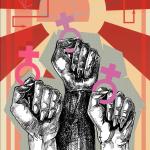Why Reds Were Better in Bed

What if you had your own guaranteed income, six month’s paid maternal leave, free health care and government-subsidized daycare? Wouldn’t that turn you on? It’s no pipe dream; for 70 years, the Soviet Bloc countries provided these benefits and much more to its women. And not solely to ensure a growing population of future workers. The Russian Revolution was sparked by women going factory to factory, demanding the Tsar pull out of World War I. At least at the initial flowering of Bolshevism, women’s rights were at the forefront. This history has been obscured, if not deliberately suppressed here in the bastion of free markets. Kristen Ghodsee, an ethnographer known for her research in Bulgaria, Romania and the Czech Republic has brought us a book that shares the same title as her opinion piece in the New York Times that went viral last year.
Why Women Have Better Sex Under Socialism: And Other Arguments for Economic Independence
By Kristen R. Ghodsee
Random House/Hachette Book Group; 240 pages
Hardcover: $22.00
November 20, 2018
ISBN: 13: 9781568588902

Not all of these benefits survived Stalin’s reign, but the mere fact of the Cold War between East and West meant healthy competition to demonstrate a superior quality of life, i.e., one free of racism and sexism. And free love did exist up to the demise of the Soviet Union in 1991 and the fall of the Berlin Wall, culminating in “The Great Orgasm War,” measured by reported sexual satisfaction of women. While the United States was sending men to the moon, Czech sexologists were uncovering the mysteries of the clitoris.
The ’70s and ’80s were the golden years for sexual expression of all types in the Eastern Bloc. A 1984 study of comparative sexual satisfaction in East and West Germany found that German Democratic Republic (GDR) youth reported being highly satisfied with their sex lives, both women and men. Eighty-five percent of the young women reported that they achieved orgasm “often” or “almost always.” The same questions were posed in 1988 in the Federal Republic of Germany (FGR) aka West Germany and less than half (46 percent) of the young women reported feeling sexually satisfied after their last sexual encounter. This compared to 84 percent of their male partners.
Ghodsee writes about the responses to her 2017 Op-Ed and uses some of them to compare the experiences of women who grew up during socialism to those of their daughters. One young Bulgarian woman wrote, the second thing her mother always asks her (after how are you?) is “Are you having enough sex?”
Sadly, we in the United States are having less and less sex according to annual social surveys. Little of the so-called sexual revolution remains 50 years after the phrase came into currency. This decade, only 66 percent of 18 to 30-year-olds reported having sex at least twice per month, compared to 73 percent 20 years ago. Eighteen percent of this age group reported having had no sex at all in 2016, the year before sexual harassment became a national concern. There may be many reasons for this, but “even the best stimulation will not help to achieve pleasure if a woman is stressed or overworked, or worried about her future and financial stability,” Ghodsee says.
One consequence is a declining birth rate, which in the United States, is at a 38-year low of 1.77 children per woman. In the first five years after free-market reforms were introduced in East Germany, the birth rate dropped by 60 percent.
Neither “lean-in feminism,” which tells us to become better at advancing our careers, nor religious exhortations about our “highest calling” offer any viable solution to this problem. Socialism by definition means social provisioning of housing, healthcare, public transportation, education and childcare. Medicare and Social Security remain the most popular government programs of all time. Social insurance for men and women, whether in or out of the workforce was introduced to Russia by Alexandra Kollantai following the 1917 revolution. It survives today and Vladimir Putin is encountering great resistance to raising women’s retirement age from age 55 to 63.
As socialism comes back into vogue today, we should be realistic about both the flaws and achievements of past socialist experiments. As Ghodsee’s book highlights, a 21st-century socialism could give us a lot more than Medicare-for-All, free public college and a Green New Deal. Whoopee!
Author Kristen R. Ghodsee is professor of Russian and East European Studies at the University of Pennsylvania and has written six books on gender, communism, and post-communism in Eastern Europe. She also writes on women's issues for the Chronicle of Higher Education. Her work has appeared as well in Eurozine, Dissent, Foreign Affairs, and The New York Times.
[Essayist Ann Schneider writes frequently for The Indypendent. Go HERE for a full list of her contributions.]
The Independent is a New York City-based progressive monthly whose moniker is "A Free Paper for Free People." It also happily accepts financial contributions. See HERE to aid its project.
